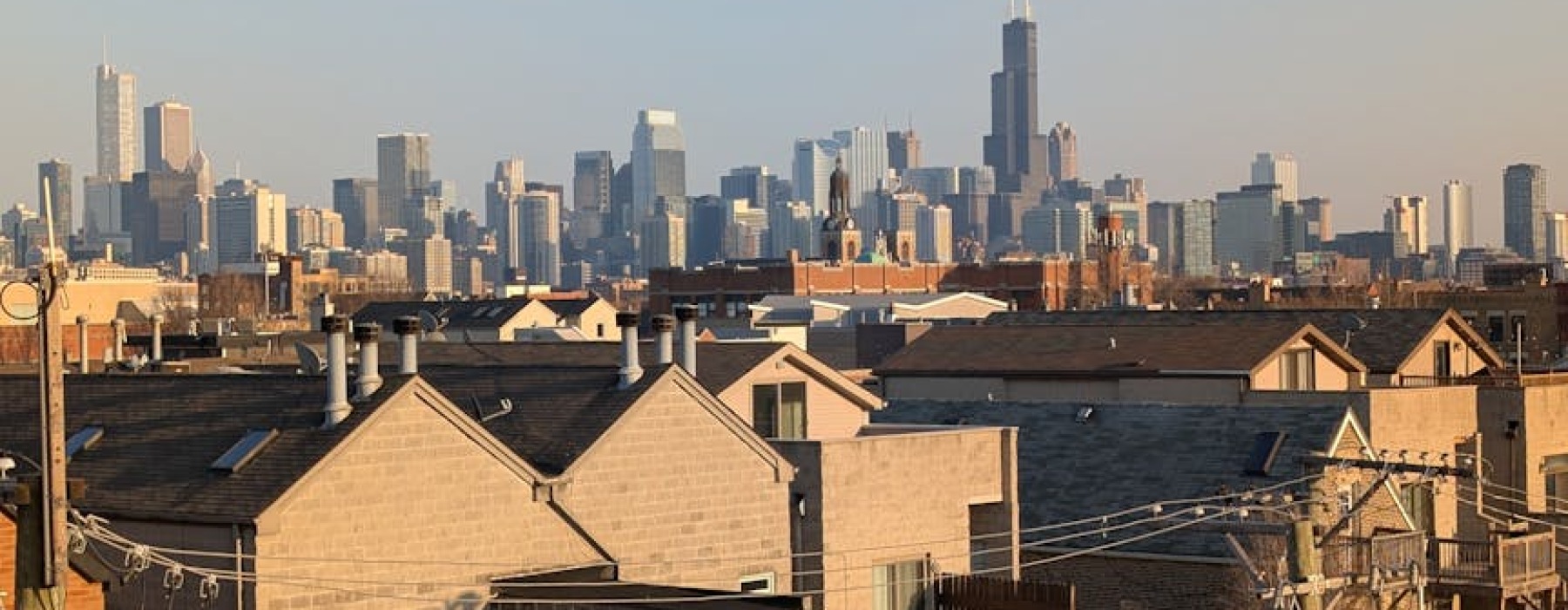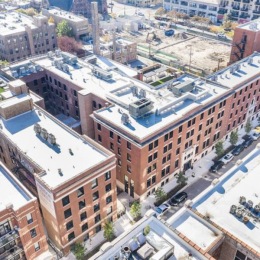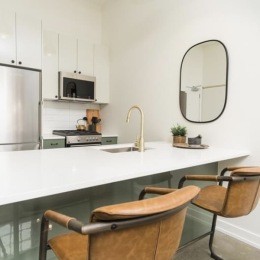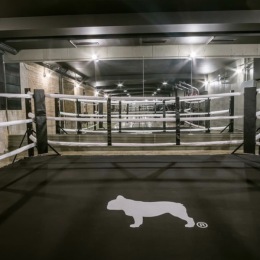Navigating Your Chicago Apartment Search
Looking for chicago apartment FAQs? Here are the essential answers at a glance:
| Question | Quick Answer |
|---|---|
| When to start looking? | 60 days before move-in; summer is peak season (higher prices), winter offers better deals |
| Credit score needed? | Typically 620+ for standard approval |
| Income requirements? | Most landlords require 2.5× monthly rent in gross income |
| Application fees refundable? | No, application fees are non-refundable; first month's rent is usually refundable if denied |
| Security deposit vs. move-in fee? | Security deposits are refundable minus damages; move-in fees are non-refundable |
| Renter's insurance cost? | $10-25 monthly for standard coverage |
Renting an apartment in Chicago can feel overwhelming, especially with 2.7 million residents and more than 100 distinct neighborhoods to choose from. Whether you're moving to the Windy City for the first time or simply relocating within its boundaries, understanding the rental landscape can save you time, money, and stress.
Chicago's rental market has its own rhythm and rules. The summer months bring higher demand and prices, while winter offers better deals for those willing to move during colder weather. Neighborhoods vary dramatically in price, from luxury high-rises in River North to more affordable options in neighborhoods like Edgewater.
What makes Chicago unique is not just its stunning architecture and vibrant culture, but also its specific rental practices and tenant protections. From the Chicago Residential Landlord and Tenant Ordinance (RLTO) to the city's Heat Ordinance, knowing your rights and responsibilities as a renter is essential.
Why does timing matter? Most property managers list available units about 60 days before they become vacant. Starting your search too early means missing out on options, while waiting too long could leave you scrambling for what's left.
Why do budgeting guidelines matter? Following the standard recommendation to spend no more than 30% of your gross monthly income on rent helps ensure you can comfortably afford not just your apartment, but also utilities, transportation, and Chicago's incredible dining and entertainment options.
This guide will walk you through everything you need to know about renting in Chicago, from budgeting and timing your search to understanding applications, tenant rights, and essential amenities.
Why this guide matters
Finding the perfect Chicago apartment isn't just about location—it's about understanding the entire rental process. With the city's diverse neighborhoods and varying price points, knowing how to steer chicago apartment FAQs is crucial for making informed decisions.
Affordability is a major concern for many renters. Chicago offers a wide range of options, from luxury apartments like The Duncan in the West Loop to more budget-friendly choices in neighborhoods like Hyde Park or Edgewater. Understanding what you can realistically afford helps narrow your search and prevents future financial strain.
Renter rights in Chicago are robust but complex. The city has specific ordinances protecting tenants that differ from other major metropolitan areas. Knowing these rights before signing a lease can save you from potential issues down the road.
Remote apartment hunting has become increasingly common, especially for those relocating from out of state. Many Chicago properties now offer virtual tours, 3D walkthroughs, and digital application processes to accommodate long-distance renters.
Budgeting & Timing Your Search
The Chicago rental market has a rhythm all its own – understanding these seasonal ebbs and flows can be your secret weapon for finding the perfect apartment at the right price.
Summer in Chicago isn't just about beaches and festivals – it's prime apartment hunting season. From May through September, the market heats up alongside the weather, with June through August being especially competitive. During these sunny months, you'll find the most options but also face higher prices and lightning-fast turnover. It's not uncommon for desirable units to be snatched up within hours of listing, sometimes even sparking bidding wars among eager renters.

Winter tells a different story. From October through April (with November through February being the sweet spot), savvy renters can score some impressive deals. Landlords often roll out the red carpet with incentives during these chillier months:
- A free month's rent (hello, vacation fund!)
- Reduced security deposits or move-in fees
- Waived application fees
- More wiggle room on lease terms
According to Chicago.gov facts, the city hosts an impressive 36 annual parades, 74 music festivals, and over 40 film festivals throughout the year. This vibrant event calendar directly impacts rental patterns, with demand spiking around major festivals and university start dates.
The magic window? About 60 days before your desired move-in date. This timing perfectly aligns with when most property managers list their upcoming vacancies, giving you the optimal selection without the stress of last-minute hunting.
Average Rents by Hot & Affordable Spots
Chicago's neighborhoods each tell their own unique story – and come with their own unique price tags. Let's explore some crowd favorites:
River North captures the hearts of young professionals with its luxury high-rises, vibrant nightlife, and downtown accessibility. One-bedroom apartments here typically run around $2,427, reflecting its status as a premier location.
West Loop has undergone a remarkable change from industrial area to culinary hotspot. One-bedrooms average around $2,671, but the investment buys you doorstep access to the famous Restaurant Row. At The Duncan, residents enjoy the perfect blend of luxury living and prime location in this sought-after neighborhood.
South Loop offers a slightly gentler price point (around $1,995 for one-bedrooms) while still delivering luxury living with easy access to museums, lakefront parks, and cultural attractions.
For more budget-conscious renters, Edgewater shines with one-bedrooms starting around $1,095. This lakefront gem offers beautiful water views, diverse dining, and a more relaxed vibe than downtown.
Hyde Park, home to the University of Chicago, blends cultural richness with green spaces, with one-bedrooms averaging around $1,602.
Lincoln Park manages to be both prestigious and (relatively) reasonable, with diverse housing options from vintage walk-ups to modern buildings at various price points.
How Much Rent Can I Afford?
Before falling in love with that stunning high-rise, let's talk numbers. Determining your rental budget is the foundation of a successful apartment search.
The classic one-third rule suggests keeping your rent at or below 30% of your gross monthly income. If you're bringing home $60,000 annually ($5,000 monthly), aim for a maximum rent of around $1,500. This guideline has stood the test of time for good reason – it helps ensure you won't be stretched too thin.
For a more holistic approach, consider the 50-30-20 rule, which suggests allocating 50% of income to necessities (including housing and utilities), 30% to wants (that amazing Chicago dining scene!), and 20% to savings and debt payments.
Remember to factor in those easily overlooked extras beyond your base rent:
- Utilities (electricity, gas, water)
- Internet service
- Parking (which can command $200-$300+ monthly in prime areas)
- Renter's insurance ($10-$25 monthly)
- Transportation costs
- Any amenity or HOA fees
The good news? Many Chicago properties, including The Duncan, offer amenities like fitness centers and community spaces that can offset external membership costs you might otherwise incur.
Online rent calculators can help you crunch the numbers based on your specific situation. Just remember – spending significantly more than 30% on rent might leave you "house poor" with little left to actually enjoy all the amazing experiences Chicago has to offer.
When Should I Start Looking?
Timing is everything in Chicago's rental market. Here's how to get it right:
The 60-day sweet spot is your target. Most landlords and property managers list available units about two months before they become vacant. Start too early and you'll waste time on properties that won't be available when you need them; wait too long and you'll be scrambling for leftovers.
Seasonal considerations matter tremendously in Chicago:
Summer (June-August) brings sunshine and the most options, but also the highest prices and fiercest competition. If summer is your move-in season, be ready to make decisions quickly – that perfect apartment won't wait around.
Fall (September-October) offers a nice middle ground with good selection and less frantic competition.
Winter (November-February) rewards the brave with the lowest prices and best incentives, though fewer options and Chicago's legendary winter weather can make moving day... memorable.
Spring (March-May) sees the market gradually warming up alongside the weather, with increasing options and moderately competitive pricing.
Not currently in Chicago? No problem. Many properties now offer virtual tours and remote application processes. At The Duncan, comprehensive virtual tours let you explore apartments and amenities from anywhere, making long-distance moves much less stressful.
Pro tip: If your schedule has flexibility, targeting a winter move-in date can save you significant money over the course of your lease – sometimes enough to offset the cost of a warm tropical vacation during those chilly Chicago months!
Applications & Approvals: Documents, Fees, Credit
Let's face it—the application process can be the most nerve-wracking part of finding your Chicago dream apartment. But don't worry! With a little preparation, you'll sail through this step with confidence.
Most Chicago landlords look for similar qualifications, which helps make the process predictable even if you're new to the city. Your credit score is one of the first things property managers will check, with most requiring a score of 620 or higher for smooth approval. If your score falls between 580-620, don't panic—you might just need to provide a guarantor or pay a higher security deposit. Scores below 580 often present challenges, but we'll cover some workarounds shortly.
For income verification, the standard requirement across Chicago is 2.5 times the monthly rent in gross income. So if you've got your eye on that gorgeous $2,000 apartment, you'll need to show you're earning at least $5,000 monthly (or $60,000 annually) to qualify without a guarantor.
When it comes to upfront costs, be prepared for application fees typically ranging from $50-$75 per applicant. These fees cover background and credit checks and are non-refundable—even if you don't get the apartment. Most properties also collect first month's rent during the application process, though this is generally refundable if your application is denied.

Chicago Apartment FAQs—Paperwork Edition
What documents do I need for a Chicago apartment application?
Think of your application package as telling your financial story. You'll typically need:
- Valid government-issued photo ID – Your driver's license, passport, or state ID will work perfectly.
- Proof of income – This usually means your last 2-4 pay stubs, though recent job-changers can often use an employment offer letter instead. Self-employed? Bring those tax returns! Some landlords also accept bank statements showing regular deposits.
- Rental history with contact information for previous landlords (they really do call them!)
- Personal references who can vouch for your reliability
- Social Security Number for those all-important credit and background checks
If you're an international student without a Social Security Number, don't worry! Bring your passport, I-20 form, admission letter, and financial aid offer. Many Chicago properties are experienced with international applicants and have alternative verification processes.
Most Chicago landlords process applications within 24-48 hours after receiving all your paperwork. However, if your references are slow to respond or your employment verification hits a snag, it might take a bit longer. Planning ahead helps avoid timing issues!
While you can apply for multiple apartments simultaneously, be mindful of those application fees—they can add up quickly! Some management companies offer the convenience of a single application that can be considered for multiple properties in their portfolio, saving you both time and money.
At The Duncan, we've streamlined the entire process with our digital application system. You can complete everything from your phone or computer, making it especially convenient if you're relocating from out of town.
Security Deposit vs Move-In Fee
One of Chicago's rental quirks that often confuses newcomers is the difference between security deposits and move-in fees. Here's what you need to know:
| Feature | Security Deposit | Move-In Fee |
|---|---|---|
| Refundable? | Yes, minus damages | No, non-refundable |
| Typical Amount | One month's rent | 1/3 to 1/2 month's rent |
| Legal Restrictions | Heavily regulated by RLTO | Minimal regulations |
| Interest Requirements | Must pay interest annually | No interest required |
| Return Timeline | Within 45 days of move-out | N/A (not returned) |
| Can be used for | Only damages beyond normal wear and tear | Administrative costs |
Chicago's Residential Landlord and Tenant Ordinance (RLTO) places strict regulations on security deposits. They must be returned within 45 days of move-out, with itemized lists for any deductions. Landlords must hold these deposits in separate interest-bearing accounts and pay that interest to tenants annually.
Because of these regulations, many Chicago landlords have shifted to non-refundable move-in fees instead. While this means less money tied up initially (move-in fees are typically lower than security deposits), you won't get this money back when you move out.
If you're bringing a furry friend along, pet policies vary widely among Chicago properties. Some charge refundable pet deposits ($200-$500), others require non-refundable pet fees ($200-$300), and monthly pet rent ($25-$50 per pet) is becoming increasingly common. The good news? Service animals are exempt from pet fees under fair housing laws.
At The Duncan, we believe in transparency about all deposits and fees, so you'll know exactly what to expect before signing your lease—no surprises!
Can I Use a Guarantor?
Not quite meeting those income or credit requirements? A guarantor (also called a co-signer) might be your ticket to approval. This option is particularly helpful if:
- Your income falls below 2.5× the monthly rent
- Your credit score doesn't quite meet the minimum requirement
- You have limited or no rental history
- You're a student or recent graduate with minimal income history
A guarantor essentially promises to cover your rent if you can't. But not just anyone can be a guarantor. They typically need:
Excellent credit (usually 700+), strong income (3-5× the monthly rent), U.S. citizenship or permanent residency, and a stable employment history. Some properties also require guarantors to live in the same state, though policies vary widely.
Being a guarantor is a significant responsibility. They're equally liable for the full rent amount, their credit can be damaged if rent isn't paid, and they can be sued for unpaid rent or damages. This obligation continues for the entire lease term—so it's no small favor to ask of someone!
If a traditional guarantor isn't an option, consider alternatives like lease guarantee services (third-party companies that act as guarantors for a fee), paying additional security deposit (where allowed by law), paying several months' rent in advance, or finding a roommate with stronger financials.
Not all properties accept guarantors, so it's important to ask about this policy early in your search if you think you might need one. At The Duncan, we understand that everyone's financial situation is unique, and we're happy to discuss your options.
Tenant Rights, Lease Flexibility & Problem Solving
Chicago renters enjoy some of the strongest protections in the country, thanks to the Residential Landlord and Tenant Ordinance (RLTO). Knowing your rights isn't just helpful—it's essential for navigating apartment living with confidence.
The RLTO serves as your rental shield, providing key protections that every Chicago tenant should understand. Your landlord must give you at least 48 hours' written notice before entering your apartment (except in genuine emergencies). If you've paid a security deposit, they must return it within 45 days after you move out. For those frustrating moments when repairs go unaddressed, you can use the "repair and deduct" remedy for essential fixes if your landlord drags their feet.
Perhaps most importantly, the RLTO protects you from retaliation. Your landlord cannot punish you for exercising your legal rights by raising your rent, decreasing services, or threatening eviction. And speaking of eviction, there are specific legal procedures landlords must follow—they can't just change your locks or throw your belongings on the curb.
Chicago's unique Bed Bug Ordinance addresses a common urban pest concern. Landlords must provide educational materials about preventing and identifying bed bugs, while tenants must promptly report suspected infestations. While the financial responsibility for extermination falls on the landlord, both parties share responsibilities for proper preparation and follow-up treatments.
If your building faces foreclosure, don't panic—you still have rights. The new owner must honor your existing lease, provide proper notice before any move-out, and ensure your security deposit transfers to the new ownership.
Regarding subleasing, policies vary widely across Chicago properties. Some leases prohibit subletting entirely, while others allow it with landlord approval of the new tenant. Be aware that even with an approved sublease, you typically remain responsible for the lease terms if your subletter fails to pay rent or damages the unit.

Chicago Apartment FAQs—Rights & Repairs
"Can my landlord enter my apartment without permission?"
Absolutely not. Privacy matters, and Chicago's RLTO requires landlords to provide at least 48 hours' written notice before entering your apartment. This notice must specify both the date and approximate time they plan to enter. The only exception is for genuine emergencies like water leaks that could damage the building.
"Can my landlord raise my rent during my lease?"
Once you've signed a lease with a specified rent amount, that figure is locked in for the entire lease term. Your landlord cannot increase your rent mid-lease unless your agreement specifically includes scheduled increases. Rent hikes typically only occur during lease renewal negotiations.
"What if I need to break my lease early?"
Life happens, and sometimes you need to move before your lease ends. Breaking a lease early usually comes with financial consequences—you may be responsible for rent until a new tenant moves in, face early termination fees (often 1-2 months' rent), potentially forfeit your security deposit, or even impact your credit score if obligations go unfulfilled.
However, certain situations allow you to break your lease without penalty, including active military duty relocation, truly uninhabitable conditions, landlord harassment or privacy violations, and certain domestic violence situations.
"What if my landlord doesn't make necessary repairs?"
When your landlord ignores repair requests, Chicago's RLTO provides a practical solution through the "repair and deduct" remedy:
- Notify your landlord in writing about the issue
- Allow 14 days for them to make repairs
- If they fail to act, you can make the repair yourself and deduct the cost from your rent (up to $500 or half your monthly rent)
For serious issues, you can also file a complaint with the city, sue for damages, or even terminate your lease if conditions are severe enough to make the unit uninhabitable.
"What if I'm locked out of my apartment?"
Landlord-initiated lockouts are strictly illegal in Chicago. If your landlord changes your locks or prevents you from accessing your apartment, contact the Chicago Police Department immediately. You can also file an emergency lockout case in court and seek assistance from the Metropolitan Tenants Organization. Courts take these violations seriously—landlords may be liable for damages of $200 per day plus your attorney's fees.
What If Issues Arise?
Even in well-maintained buildings like The Duncan, occasional issues can pop up. Here's how to handle common rental challenges in Chicago:
Pest Control Concerns
Chicago's density and historic buildings can sometimes lead to pest issues. If you spot unwelcome critters, report sightings to your landlord immediately in writing and document the problem with photos. Be prepared to allow access for extermination services and follow all preparation instructions for treatments. Landlords are responsible for pest control in most cases—this isn't a DIY situation.
Chicago's Heat Ordinance
Chicago winters demand reliable heating, which is why the city's Heat Ordinance sets strict temperature requirements. From September 15 to June 1, your landlord must maintain temperatures of at least 68°F during the day (5:30am-10:30pm) and 66°F overnight.
If your apartment feels like an icebox, document the temperature with photos of a thermometer and report violations to 311. Never use your oven or unsafe space heaters as heating alternatives—your comfort isn't worth the safety risk.
Dispute Resolution Resources
When issues with your landlord become ongoing problems, several excellent resources can help:
- Metropolitan Tenants Organization: (773) 292-4988
- Chicago Rents Right Hotline: 312-742-RENT
- Center for Conflict Resolution: (312) 922-6464
- Legal Aid Chicago: (312) 341-1070
At The Duncan, we believe the best tenant issues are the ones that never happen. Our 24-hour maintenance request system ensures prompt attention to problems, while our on-site management team works proactively to address concerns before they escalate. We understand that your home should be your sanctuary, not a source of stress.
Amenities, Utilities & Lifestyle Essentials
Let's face it – the amenities in your Chicago apartment can make or break your daily living experience. Gone are the days when a roof and four walls were enough. Today's renters are looking for features that truly improve their lifestyle.
When you tour luxury properties like The Duncan in the West Loop, you'll find amenities that transform apartment living into something special. Imagine taking a refreshing dip in an indoor swimming pool on a snowy February morning, or unwinding on a rooftop deck with friends as the Chicago skyline lights up around you. These aren't just nice-to-haves – they're game-changers for your quality of life.
Pet owners rejoice! Many modern Chicago buildings now welcome your furry friends with open arms, offering dedicated pet areas and even pet washing stations for those muddy post-park visits. For cyclists navigating Chicago's expanding bike lane network, secure bike storage and repair stations eliminate the headache of squeezing your bike into a tight apartment.
One amenity that might seem small but makes a massive difference? In-unit washers and dryers. Trust me, you'll never fully appreciate this convenience until you've lugged laundry baskets down six flights of stairs during a Chicago winter!
Setting up utilities is one of those adulting tasks that comes with every move. In Chicago, you'll typically need to arrange:
- Electricity: ComEd serves most of Chicago (1-800-334-7661)
- Gas: Peoples Gas is the primary provider (866-556-6001)
- Water: Often included in rent or billed through your building
- Internet/Cable: Choose between AT&T Fiber, Comcast Xfinity, and RCN for your streaming and scrolling needs
Don't forget renter's insurance – it's an absolute must-have that typically costs just $10-$25 monthly. Many buildings require it, and for good reason. That affordable policy protects your belongings against theft, fire, and other damages that could otherwise leave you starting from scratch.

Must-Have vs Nice-to-Have Features
When apartment hunting in Chicago, it helps to distinguish between your non-negotiables and your wish-list items. This clarity will save you time and potentially prevent budget creep.
Must-have features are the deal-breakers – the essentials you simply can't live without. For most Chicago renters, these include reliable heating (an absolute necessity during those polar vortex days) and cooling for the surprisingly humid summers. Secure entry systems provide peace of mind, while functioning appliances, adequate storage, and access to laundry facilities (whether in-unit or in-building) handle daily practicalities.
Location matters tremendously in Chicago. Proximity to public transportation can literally save you hours each week on your commute. And in a city with distinct seasons, responsive maintenance becomes crucial when radiators clank or air conditioners falter.
Nice-to-have features are worth paying a bit more for if your budget allows. That in-unit washer/dryer eliminates weekend trips to the laundromat, while dedicated parking saves you from the uniquely Chicago experience of digging your car out of snow banks or circling for street parking.
Modern kitchens with dishwashers and garbage disposals make meal prep and cleanup infinitely easier. Hardwood floors add warmth and character while being easier to keep clean. And as remote work becomes more common, those coworking spaces in newer buildings provide a professional setting without the commute.
Luxury amenities lift your living experience to hotel-like comfort. Premium buildings like The Duncan offer resort-style swimming pools, state-of-the-art fitness centers that eliminate gym membership costs, and rooftop lounges perfect for entertaining. Concierge services, package receiving, and smart home features add convenience to your daily routine.
Before starting your search, create a personalized checklist ranking these features. This will help you focus on properties that meet your essential needs while staying within your budget. Remember – you can always add luxuries later, but location and core functionality are fixed from day one.
Utilities & Internet 101
Setting up utilities in your Chicago apartment requires some advance planning to ensure everything's working when you arrive with that first load of boxes. Here's your roadmap:
Electricity powers everything from your lights to your refrigerator. ComEd (Commonwealth Edison) is Chicago's primary electricity provider. Call them at 1-800-334-7661 or visit ComEd.com to schedule service beginning on your move-in date. Monthly costs typically range from $60-$120 depending on your unit size and usage habits.
Gas fuels your heating and possibly your stove and water heater. Peoples Gas handles most of Chicago's natural gas service. Contact them at 866-556-6001 or through PeoplesGasDelivery.com about 5-7 days before moving in. Expect to pay around $30-$80 monthly, with higher bills during winter heating season.
Water is usually simpler – it's typically included in your rent or billed through building management. If your unit is separately metered (uncommon in apartments), the City of Chicago handles water billing.
Internet & Cable connect you to the world. Chicago offers several providers including AT&T Fiber, Comcast Xfinity, and RCN. Compare speeds and promotional rates before choosing, and schedule installation 1-2 weeks before move-in to avoid connectivity gaps. Monthly costs range from $40-$100 depending on speed and services.
Before moving day, create a utility setup checklist:
- Review your lease to confirm which utilities you're responsible for
- Contact providers at least 2 weeks before moving
- Schedule necessary in-person installations
- Update your address with each provider
- Set up paperless billing and autopay to avoid missed payments
- Ask about energy efficiency programs that might reduce your costs
Many Chicago buildings, including The Duncan, offer assistance with utility setup, helping new residents steer the process with minimal stress. This support can be especially valuable if you're moving from out of state or are unfamiliar with Chicago's utility landscape.
Remote & Self-Guided Tours
The apartment hunting process has evolved dramatically in recent years, with technology making it possible to find your perfect Chicago home without ever setting foot in the city. This shift has been a game-changer for relocating professionals, students, and anyone trying to secure housing from a distance.
3D virtual walkthroughs offer an immersive experience that's the next best thing to being there. These sophisticated tours allow you to:
- Move through apartments at your own pace
- Get a genuine feel for room dimensions and layouts
- Zoom in on finishes and details
- Revisit spaces multiple times as you compare options
Video tours come in two flavors. Pre-recorded videos provide consistent, professionally produced walkthroughs of units and amenities. Live video tours via FaceTime or Zoom offer the advantage of real-time interaction – you can ask questions and request closer looks at specific features that matter to you.
Self-guided tours have revolutionized the in-person experience. Platforms like Tour24 enable you to:
- Schedule visits outside traditional office hours
- Access units through secure, temporary entry codes
- Explore at your own pace without feeling rushed
- Review digital information about features while on-site
If you're apartment hunting remotely, follow these best practices for success:
- Research neighborhoods thoroughly before scheduling tours
- Prepare specific questions about the unit and building
- Ask to see details that might not be obvious in photos
- Request information about ambient noise and natural light
- Get measurements for specific spaces if you have furniture concerns
At The Duncan, we understand the challenges of remote apartment hunting and offer comprehensive virtual tour options. Our detailed 3D walkthroughs and responsive leasing team ensure you can make confident decisions even when you can't visit in person. We've helped countless residents find their perfect West Loop home sight-unseen, with a seamless process from virtual tour to move-in day.
Core Chicago Apartment FAQs Answered
Looking for quick answers to your burning questions about renting in Chicago? We've gathered the most common chicago apartment FAQs based on our experience helping thousands of renters find their perfect home in the Windy City.

Let's start with the basics: timing your search is crucial in Chicago's competitive market. The sweet spot is about 60 days before your desired move-in date. Starting earlier means many available units won't be listed yet, while waiting until the last minute severely limits your options.
When it comes to budgeting, follow the trusted 30% rule—your rent shouldn't exceed 30% of your gross monthly income. Earning $5,000 monthly? Try to keep your rent around $1,500 to maintain financial comfort.
Neighborhood pricing varies dramatically across Chicago. Expect to pay premium prices in River North ($2,427 for a one-bedroom) and the trendy West Loop ($2,671), while more budget-friendly options exist in neighborhoods like Edgewater, where one-bedrooms start around $1,095.
The application process requires preparation. Have your government ID, proof of income (pay stubs or offer letters), rental history, personal references, and Social Security Number ready. Most landlords look for credit scores above 620—lower scores might require a guarantor or additional security deposit.
Confused about fees and deposits? Here's the breakdown: application fees ($50-$75) are non-refundable, while security deposits (typically equal to one month's rent) are refundable minus damages when you move out. Move-in fees, on the other hand, are non-refundable administrative charges. First month's rent deposits are generally refundable if your application is denied.
Don't forget about renter's insurance! Most landlords require it, and it's a smart investment regardless. For just $10-$25 monthly, you're protecting your belongings and personal liability.
If your income or credit doesn't quite meet requirements, many landlords accept guarantors (co-signers). These financial backers typically need excellent credit and income that's 3-5 times the monthly rent.
Chicago Apartment FAQs—Cost & Credits
When it comes to income requirements, most Chicago landlords want to see your gross monthly income reaching at least 2.5 times the monthly rent. Some luxury buildings might set the bar higher at 3 times the rent.
The application timeline is relatively quick—credit checks are usually completed within 24-48 hours as part of the overall application process. Yes, landlords will verify your employment by calling your employer or requesting documentation like pay stubs and offer letters.
If you're working with less-than-perfect credit, don't lose hope. While challenging, securing an apartment is still possible with a guarantor, larger security deposit, or by focusing on smaller landlords who might offer more flexibility.
For utility budgeting, set aside approximately $100-$200 monthly for electricity, gas, and internet, depending on your apartment size and usage habits.
Looking for deals? Move-in specials are most common during winter months (November-February), when you might snag incentives like one month free rent or reduced fees. Speaking of winter, yes—it's generally cheaper to rent during these colder months due to lower demand.
If you need parking, budget accordingly. Reserved parking typically costs $200-$300+ monthly in downtown neighborhoods, with lower rates in outlying areas.
Chicago Apartment FAQs—Pets, Roommates & Sublets
Finding pet-friendly apartments in Chicago is easier than you might think. Many buildings welcome furry friends, but be prepared for pet fees that typically include a one-time non-refundable fee ($200-$500), monthly pet rent ($25-$50 per pet), or a refundable pet deposit ($200-$500).
Be aware of breed restrictions—many buildings limit dog breeds (commonly Pit Bulls, Rottweilers, and Dobermans) and set weight limits around 40-50 pounds.
Planning to add roommates after signing? Most leases require all adult occupants to be listed and approved. Adding someone typically requires landlord approval and possibly an additional application process.
Subletting policies vary widely between buildings. Most leases require landlord approval, and the original tenant typically remains responsible for the lease terms even with a subletter.
If your roommate moves out early, you're usually still responsible for the full rent amount. Finding a replacement roommate (with landlord approval) is the most common solution.
Regarding utilities, water and trash service are commonly included in rent. Heat is sometimes included, especially in older buildings, while electricity, gas, and internet are typically tenant responsibilities. Plan to set up utilities 1-2 weeks before move-in by contacting providers like ComEd (electricity) and Peoples Gas.
Many buildings have specific move-in procedures, requiring scheduled freight elevator use and sometimes charging move-in/out fees to cover potential damages during the process.
Finally, if you encounter a dispute with your landlord, document everything in writing, refer to your lease and the RLTO for your rights, and consider contacting the Metropolitan Tenants Organization or legal aid if needed.
With these answers to common chicago apartment FAQs, you'll be well-equipped to steer your apartment search with confidence. At The Duncan in the West Loop, we're always happy to answer additional questions specific to our community and help make your apartment hunting experience smooth and successful.
Conclusion
Finding your perfect Chicago apartment doesn't have to feel like searching for a needle in a haystack. With the chicago apartment FAQs we've covered, you now have a roadmap to steer everything from budgeting and timing to tenant rights and amenities.
The rental journey in Chicago has its own rhythm—starting your search 60 days before your move-in date puts you in the sweet spot where you'll see plenty of options without jumping the gun. Summer brings more choices but higher prices, while winter offers better deals if you're willing to brave moving during Chicago's chillier months.
When it comes to finding your ideal Chicago home, The Duncan Apartments by Flats® offers an exceptional West Loop living experience just steps from the city's renowned Restaurant Row. Our thoughtfully designed floor plans combine style and functionality, while our luxury amenities—including an indoor pool that laughs in the face of Chicago winters and a stunning rooftop lounge with skyline views—lift everyday living.
Whether you're a Chicago native or relocating from across the country, our streamlined application process makes securing your new home refreshingly simple. Our dedicated leasing team genuinely cares about matching you with an apartment that fits your lifestyle, not just your budget.
Understanding Chicago's rental landscape gives you a significant advantage. Being prepared with proper documentation, knowing your rights under the RLTO, and having realistic expectations about costs and timing will make your apartment hunt considerably less stressful.
For specific details about our community, available floor plans, or to schedule an in-person or virtual tour, our FAQs page has you covered. We're excited to welcome you home to The Duncan, where luxury, convenience, and community come together in one of Chicago's most vibrant neighborhoods.
Remember—asking questions is your best tool during the apartment search. Don't hesitate to clarify anything that seems unclear in your lease or during the application process. With this guide as your companion, you're well-equipped to find and secure your perfect Chicago home with confidence.







